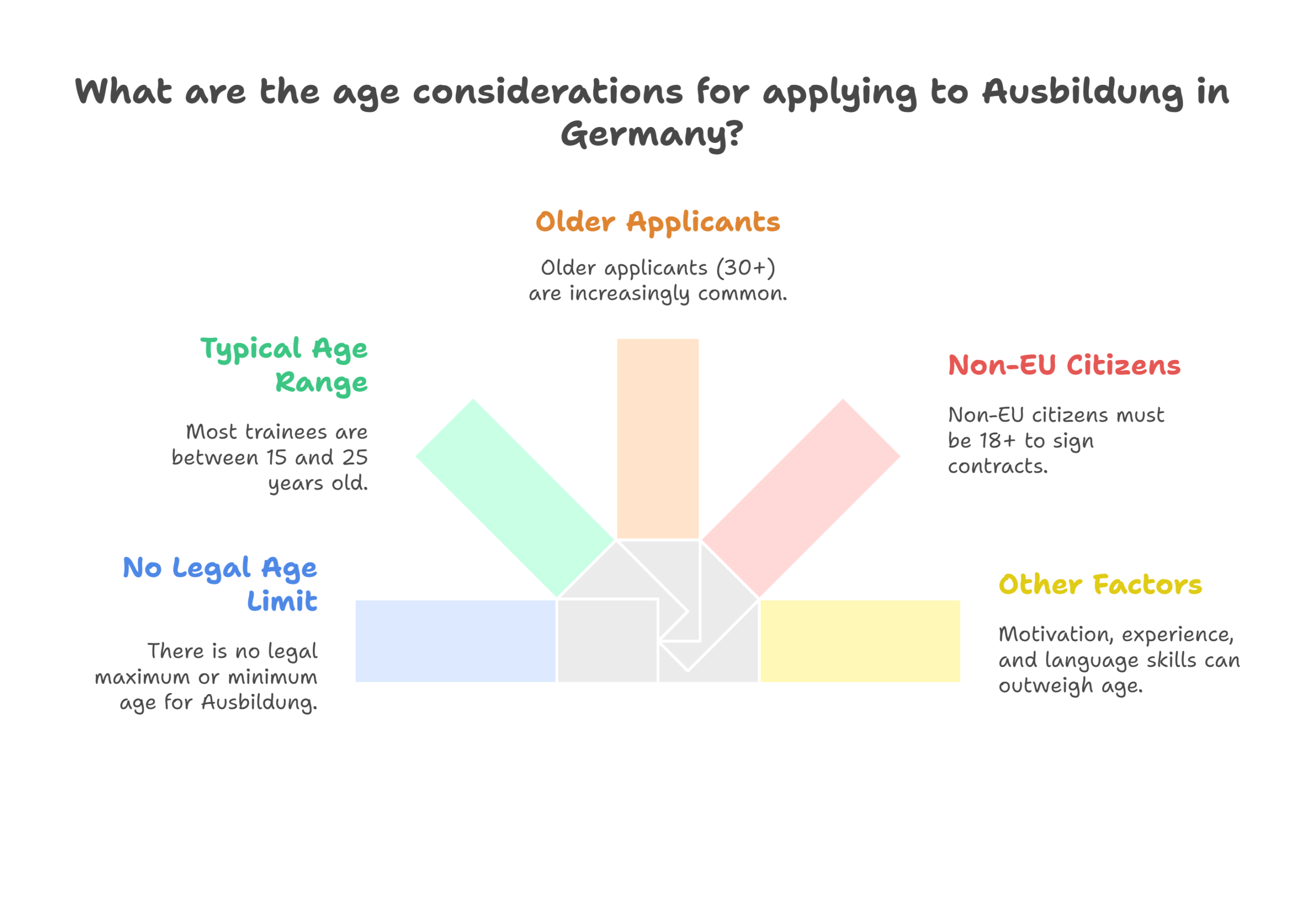| Age Group |
Commonality |
Notes |
| 15–18 |
Very common |
Directly after school |
| 19–25 |
Most common |
After gap years or studies |
| 26–29 |
Increasing trend |
Accepted in many fields |
| 30+ |
Less common |
Possible in high-demand sectors |
Visa Considerations: Rules for Non-EU Applicants
For non-EU citizens, visa rules apply strictly. You usually need to be at least 18 years old. This is because you must sign legal contracts. In Germany, people under 18 have limited legal capacity. Being 18 or older proves you’re ready for responsibility. Embassies often prefer applicants under 30. This is not a rule but a trend. Older applicants must show strong motivation and financial readiness.
📌 Important Visa Factors for Non-EU Candidates:
-
Minimum age: 18 years
-
Must prove financial support
-
Contract signing requires legal adulthood
-
Age over 30 may require extra justification
In summary, while there’s no official age limit, being between 18 and 30 offers the best chances—especially for non-EU applicants. However, older candidates are still accepted in the right conditions.
Free German A1 Mock Tests – Powered by AI!
Test your skills on our interactive platform. Get instant feedback from our AI to help you communicate better and track your progress. Start your free German mock test now.
Test Your German A1 for Free
Ausbildung Age Limit in Germany: Age and Employer Preferences
Age plays a role in Ausbildung applications in Germany. Some fields prefer younger applicants, but others welcome older ones. Let’s explore where older trainees fit best and what challenges exist.
High-Demand Fields for Older Applicants
Many sectors need skilled workers and accept older trainees. Fields like nursing, IT, and hospitality often accept 30+ candidates. These industries value maturity and previous life experience. Employers appreciate older candidates’ focus and responsibility. They know older trainees are often more committed. Career changers are common in these fields today. Many companies support older learners with training help.
✅ Top Fields for Older Ausbildung Applicants:
-
Nursing – Needs mature and patient workers
-
IT – Skills matter more than age
-
Hospitality – Life experience is highly valued
📌 Why These Fields Welcome Older Applicants:
-
Shortage of trained workers
-
Willing to train serious adults
-
Flexible on age if skills are strong
Challenges for Older Trainees
Older candidates may face extra hurdles during Ausbildung. One challenge is competing with younger applicants. Employers may think younger trainees learn faster. Physical work may be harder for older trainees. Classroom learning after years may feel strange. Adapting to German culture also takes time. Some worry older trainees may not stay long. These challenges can be managed with good preparation.
🚧 Common Challenges for Older Applicants:
-
Compete with fresh school graduates
-
Return to classroom after long break
-
Handle physical job demands
-
Face doubts about long-term plans
-
Adjust to workplace culture quickly
💡 Tips to Overcome Challenges:
-
Show strong interest and motivation
-
Highlight past work experience
-
Learn about German work culture
-
Build good German language skills
-
Be confident and stay consistent
With effort and preparation, age won’t hold you back. Many employers now value what older trainees bring to the table.
How to Apply as an Older Candidate
Applying for Ausbildung as an older candidate needs a clear plan. You may not be the usual age group, but that’s okay. With the right approach, you can still succeed. Let’s look at some helpful tips that improve your chances.
Tips for Success
Older candidates have many strengths they can showcase. Your past experience can set you apart from others. Employers value maturity, commitment, and life skills. Here are simple ways to stand out and get selected:
✅ 1. Highlight Prior Experience
Your past work can be a big advantage.
-
Talk about relevant roles you’ve done
-
Example: Caregiving work suits nursing Ausbildung
-
Mention skills like teamwork, patience, and discipline
-
Include certificates or job letters if available
-
Show how your experience matches the Ausbildung field
✅ 2. Achieve German B1/B2 Proficiency
Language is key for success in Ausbildung.
-
Most programs need at least B1 German level
-
B2 level is better for healthcare or public roles
-
Good language skills show you’re serious
-
It also helps in class and daily work
-
Join a German course early to prepare well
📌 Recommended Levels:
| Field |
Language Level Needed |
| Nursing |
B2 |
| IT |
B1–B2 |
| Hospitality |
B1 |
| Mechanics |
B1 |
✅ 3. Address Age in Interviews
Talk openly about your age and goals.
-
Show that you’re ready for long-term work
-
Explain your career change clearly and simply
-
Mention your stability and strong motivation
-
Let them know you plan to stay in Germany
-
Show how your age adds value, not limits
💬 Interview Tip:
Say, “I bring experience and I’m fully committed to this path.”
By showing strong language skills and useful experience, you can impress employers. Being older can be a strength—if you present it well.
Visa and Financial Support
If you’re from outside the EU, applying for Ausbildung involves extra steps. Two important things you must prepare for are your visa and financial support. Let’s look at what’s required and what kind of aid is available.
Visa Requirements
To get a visa, you must show financial stability. German authorities want to be sure you can live there. You need to prove you can cover basic monthly expenses.
✅ Main Options for Visa Approval:
-
Show a blocked account with at least €959 per month
-
Or submit your Ausbildung contract with monthly pay
-
If salary is low, show extra savings or sponsor proof
-
Visa officers want to see steady, reliable income
-
Always check the latest visa checklist at the embassy
📌 Minimum Monthly Funds for Visa:
| Option |
Amount Required |
| Blocked Account |
€959/month (approx.) |
| Ausbildung Salary (Net Pay) |
At least €959/month |
| Combined (Salary + Savings) |
Must meet total need |
Financial Aid
Ausbildung programs offer a monthly stipend to support trainees. The amount depends on the industry and employer. Some programs also offer housing help or travel bonuses.
✅ What Financial Support Can You Expect?
-
Monthly salary: €500 to €1,200 depending on job field
-
Public training programs usually offer lower pay
-
Private or in-demand sectors often pay more
-
Some employers provide free housing or meal vouchers
-
In some regions, you can get housing support from the state
📊 Average Monthly Stipend by Field:
| Field |
Approximate Monthly Pay |
| Nursing |
€1,100–€1,200 |
| IT |
€800–€1,100 |
| Hospitality |
€700–€900 |
| Crafts/Trade |
€500–€800 |
💡 Important Tip:
Always ask your employer about housing or extra allowances.
In short, proper financial planning helps you succeed with your visa. Plus, your Ausbildung salary can cover most living costs. Be ready with all documents, and you’re one step closer to Germany.
Master the German Language with Entri App! Click Here for Free Trial Class!
Free German A1 Mock Tests – Powered by AI!
Test your skills on our interactive platform. Get instant feedback from our AI to help you communicate better and track your progress. Start your free German mock test now.
Test Your German A1 for Free
Success Stories & Future Trends
More people are choosing Ausbildung later in life. Older candidates are joining training programs across Germany. Many start Ausbildung in their 30s or even 40s. Career changers and migrants are a growing group. They want stable jobs and a better future. This trend is becoming common in many industries. Age is now seen as less of a barrier.
General Trends Among Older Trainees
Training centers see more older applicants every year. Fields like nursing and IT attract mature candidates. Employers value experience, reliability, and commitment to learning. Older trainees often perform well in practical training. Language skills and motivation matter more than age. Age diversity in Ausbildung is now increasing steadily.
Why Older People Choose Ausbildung:
-
Career switch or better job security
-
Chance to earn while learning
-
A path to long-term German residency
-
Clear structure and visa-friendly programs
These reasons make Ausbildung popular among older adults.
Predicted Changes: A More Age-Friendly Future
Germany has labor shortages in key skilled jobs. This makes employers open to hiring older trainees. Skill and attitude are now valued over age. More companies want motivated and responsible trainees. Flexible visa rules also support older applicants now. We expect more 30+ trainees in coming years.
📊 Future Trends Table
| Trend |
Impact |
| Shortage of skilled workers |
More training spots for 30+ candidates |
| Age-inclusive hiring |
Employers accept mature applicants |
| Focus on soft skills |
Maturity seen as a strength |
| Easier training visas |
Better access for non-EU applicants |
Ausbildung is becoming more flexible and inclusive. With effort and preparation, age is no barrier. Older trainees can succeed and build stable futures.
Conclusion
Starting an Ausbildung at 30 or 40 is possible. Age does not stop anyone from building a career. The key is preparation and strong motivation. Germany needs skilled workers in many fields today. This opens doors for older trainees everywhere. With the right skills, you can stand out easily. Ausbildung age limit in Germany is more flexible than many believe.
Older candidates bring valuable life and work experience. Employers now see age as a strength. Fields like nursing and IT welcome mature applicants. Language skills remain a top requirement for success. Financial and visa support also make this journey easier. Your age should inspire confidence—not doubt.
Key Takeaways
-
No legal age limit for Ausbildung in Germany
-
Most trainees are aged 15–25, but older ones succeed
-
Nursing, IT, and hospitality welcome 30+ applicants
-
B1/B2 German proficiency is strongly recommended
-
Financial proof or salary needed for visa approval
-
Real-life stories show success at 30, 35, or even 40
-
Labor shortages are helping older candidates get accepted













